LIBERALS’ HOPED-FOR SUPPORT SURGE IN WAKE OF UNDER-40 TARGETED SPENDING BLITZ HAS YET TO MATERIALIZE

A month-long political sales job by Prime Minister Justin Trudeau, his cabinet and caucus attempting to raise awareness and – crucially – support for a slew of budget spending measures aimed making life affordable for Canadians has yet to pay off.
In a bid to climb out of a 20-point deficit in vote intention, this year’s budget invested heavily in Gen Z adults and Millennials, loading $8.5 billion in spending on housing and other affordability measures, to woo Canadians under 40, while forecasting a nearly $40-billion deficit for the next fiscal year.
The problem? These key vote demographics do not appear to be picking up what the Liberals are throwing down. New data from the non-profit Angus Reid Institute finds Trudeau and the Liberals’ “generational fairness” budget has had no effect on the party’s electoral fortunes so far.
The opposition Conservatives lead the Liberals by a margin of nearly two-to-one (43 per cent versus 23 per cent) while the NDP are a not-to-distant third at 19 per cent. The Liberals are also the third choice among the Gen Z and Millennial voters they’re trying to win over, trailing both the NDP and CPC among those age cohorts.
However, this does not mean the budget’s measures are unpopular. At least seven-in-ten Canadians approve of the pharmacare (70%), dental care (73%) and Canada Disability Benefit (74%) included in the budget. Measures to address the housing affordability crisis – leasing out federally owned lands to build affordable housing (68%) and funding infrastructure such as pipes for new housing developments (65%) – are also popular.
At issue for many Canadians, though, is there is little belief that the budget as a whole will improve their personal financial situation, Canada’s economy, or the housing affordability crisis. In fact, a majority say the changes planned by the federal government will have a detrimental effect on these fronts instead.
Meanwhile, half (47%) of Canadians say they are more pessimistic about the future of their personal financial situation, and a majority (56%) say their outlook for Canada’s economy has grown more negative in the wake of the budget.
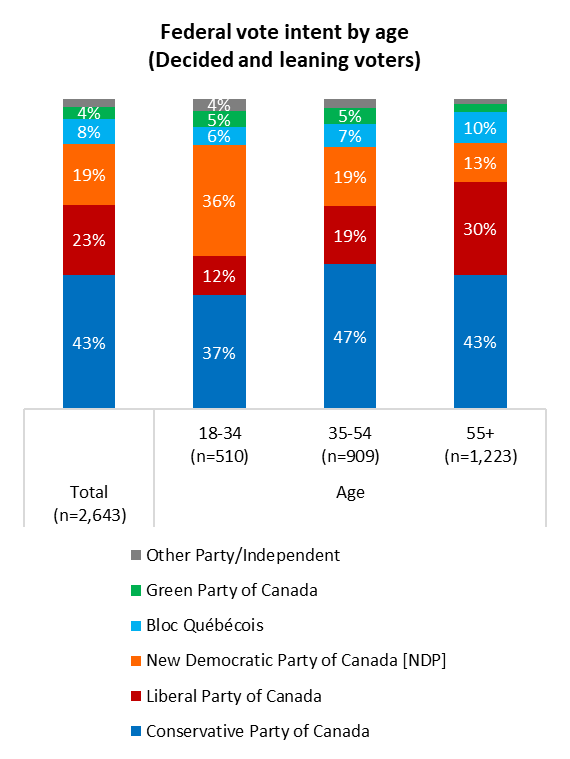
More Key Findings:
- Renters are more likely to park their vote with the Conservatives (34%) or NDP (31%) than the Liberals (18%) if an election were held today.
- Conservative leader Pierre Poilievre is viewed more positively among Gen Z adults than Trudeau (29% vs 17%). He also has a higher favourability than Trudeau’s approval among younger (35% vs. 27%) and older (39% vs. 27%) Millennials.
- Few undecided voters (5%) or those not very committed to their party choice (5%) say their opinion of Trudeau has improved in recent weeks.
- Half (50%) believe increasing the capital gains inclusion rate is a “good idea” because “wealthy Canadians do not pay their fair share of taxes.” One-third (34%) disagree, saying “taxing capital gains hurts economic growth”.
About ARI
The Angus Reid Institute (ARI) was founded in October 2014 by pollster and sociologist, Dr. Angus Reid. ARI is a national, not-for-profit, non-partisan public opinion research foundation established to advance education by commissioning, conducting and disseminating to the public accessible and impartial statistical data, research and policy analysis on economics, political science, philanthropy, public administration, domestic and international affairs and other socio-economic issues of importance to Canada and its world.
Part One: Did budget 2024 move the vote needle? No
When Prime Minister Justin Trudeau announced the federal government’s budget, he said it was focused on “generational fairness”.
“[Millennials and Gen Z’s] success is Canada’s success in the future, sure, but also right now,” Trudeau said. “But the economy isn’t rewarding them the way it used to reward their parents and grandparents. That’s not right. That’s not fair.”
The budget was filled with measures to address housing affordability, a particular sore-spot for many younger Canadians who choose it as an important issue at higher rates than older ones and are much less likely to be homeowners (see detailed tables).
While “generational fairness” might be the altruistic goal, the Liberals also have another aim in mind: closing the polling gap between them and the Conservatives, who have held a solid lead in vote intention for much of the past year. To do so, they believe they need to secure the votes of Canadians under 40, a group who initially helped Trudeau secure a majority Liberal government in 2015, but have increasingly looked elsewhere politically.
Vote intent
Overall, the Conservatives currently have the support of more than two-in-five (43%) of Canadians. Approaching one-quarter (23%) say they would vote Liberal if an election were held now, while one-in-five (19%) say they would support the NDP. This is notably similar to data taken by the Angus Reid Institute in recent months.

Sharing detailed budget information did not drive votes
While the budget, and the slow drip of announcements by Trudeau and his cabinet that preceded it, has dominated the conversation among politicos in recent weeks, it arrives at a busy time for Canadians. The NHL playoffs, post-secondary exams, and taxes are all commanding attention, so many not have full awareness of all that the latest budget entails.
To understand how much of a difference awareness of budget measures affects vote intention, the Angus Reid Institute developed a two-part survey. One part was a series of questions on vote intentions, while the other was a series of detailed questions on the budget. Respondents were split into two groups: the first saw the voting questions first and the budget questions second. The other saw the budget questions first and the vote questions second (read the questionnaire to see both sets of questions).
There is no statistical difference between the two groups, suggesting that at least initially, the budget has not influenced Canadians’ vote intention.

Renters are unmoved
Given the Liberal government’s aim to address housing affordability with this recent budget, Canadian renters are key group to understand. The Liberals trail both the NDP and Conservatives in vote intention among renters. Instead, the Liberals perform best among owners with no mortgage, capturing one-quarter (27%) of vote intention, but still trailing the Conservatives, who have the support of nearly twice as many in that group (48%):
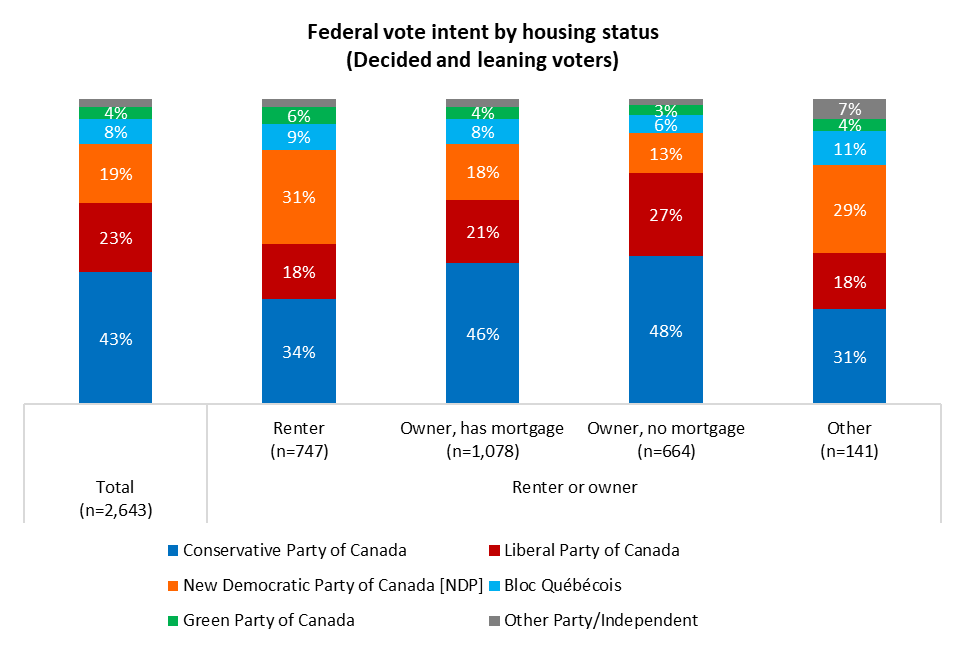
The generation cutoff for Millennials is considered to be 1996, while Gen Z are between the ages of 12 and 27. Evidently, the Liberals and Trudeau have more work to do to bring Gen Z and Millennials to their side. The Liberals are third behind the NDP and CPC among Gen Z adults and both younger and older Millennials. The party is much more popular among Canadians older than 54, but still trail the Conservatives among those demographics:
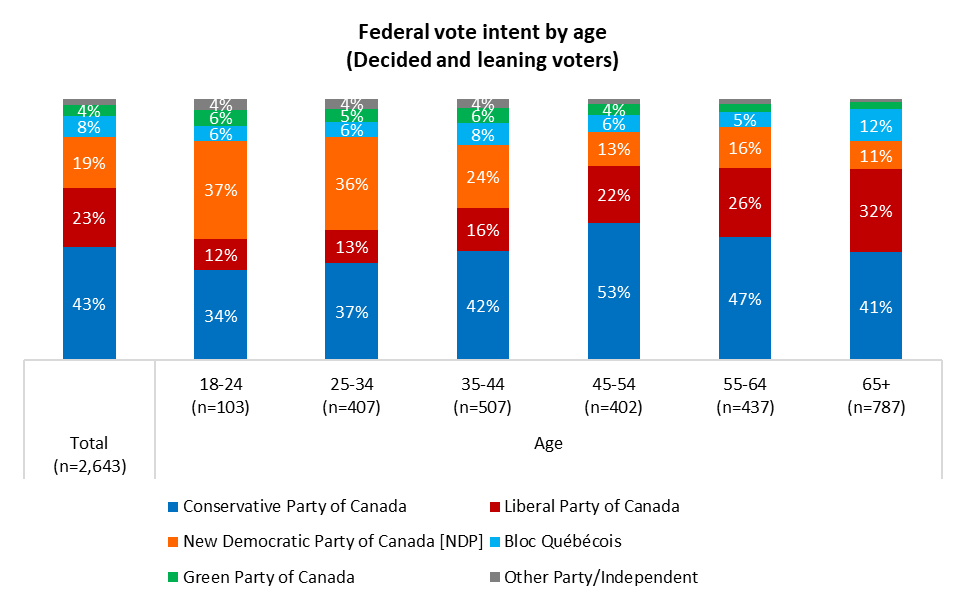
Meanwhile, the Conservatives are ahead of the Liberals in every region in the country. The Liberals garner the most support in Atlantic Canada, home to only 32 of the 343 seats which will be contested in the next federal election (see detailed tables).
Canada’s major urban centres are suffering the worst from the country’s housing affordability crisis and are also where the Liberals need to make headway to improve their fortunes in the election whenever it arrives. Post budget, the Liberals are behind the NDP and the Conservatives in Vancouver and trail the CPC in Toronto’s core and outskirts. Trudeau and the Liberals fare better in Montreal, but find themselves in a close race with the Bloc Québécois (30%) and NDP (24%):
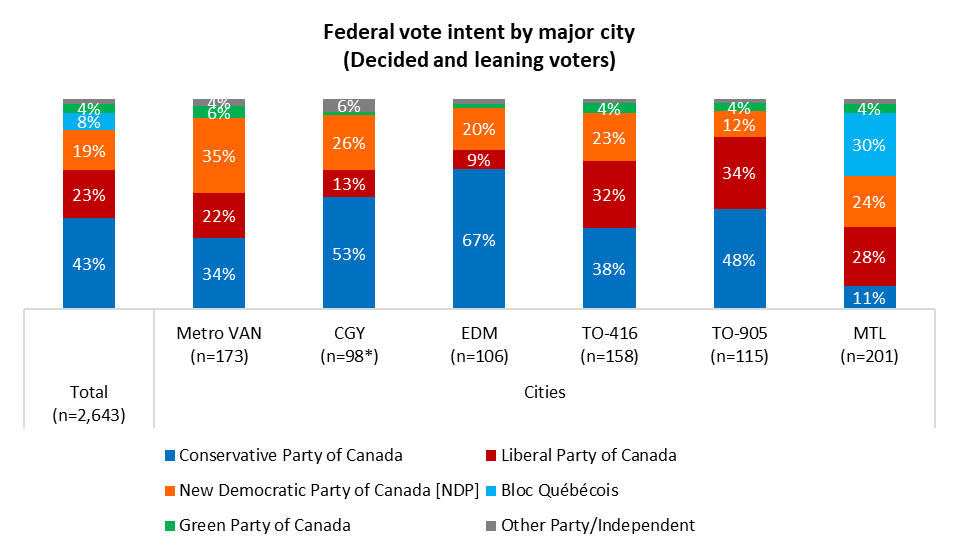
*Smaller sample size, interpret with caution
Approval
Trudeau continues to be viewed negatively by the majority of the country, including approaching half (46%) who strongly disapprove of his performance as prime minister.
As the Liberals make overtures to Gen Z and Millennials, there remains much work to be done to improve popularity of the prime minister among those generations. Gen Z adults are the most likely to say they don’t have an opinion of Trudeau (16%) but are also the least likely to have a positive one (17%, see detailed tables). Millennials offer more positivity (27% approve of Trudeau), but also stronger negative reviews (42% of 25-34s, 46% of 35-44s strongly disapprove, see detailed tables).
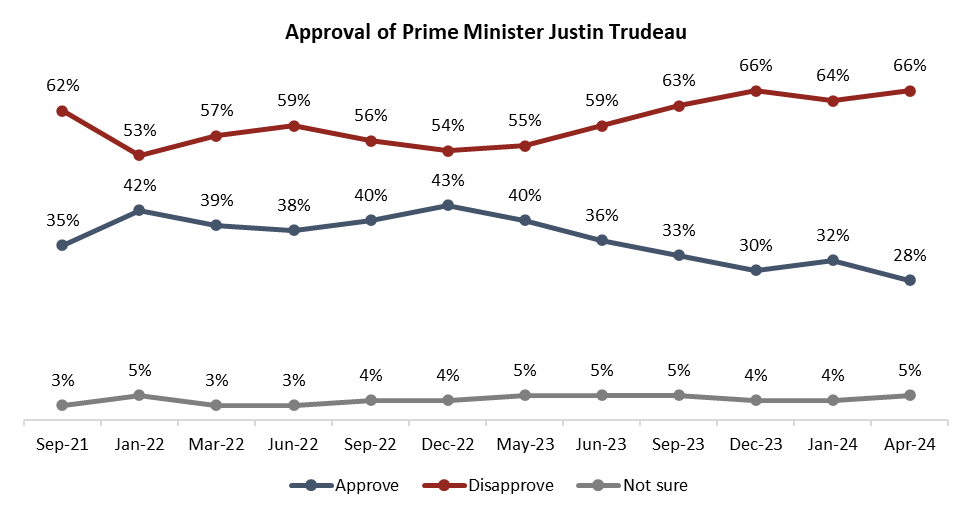
Poilievre continues to bump up against a favourability ceiling. Two-in-five (39%) Canadians say they have a positive impression of the official leader of the opposition, statistically similar to data taken over the past seven months.
However, Poilievre is viewed more favourably among Gen Z adults than Trudeau (29% vs. 17%), younger Millennials (35% vs. 27%) and older ones (39% vs. 27%, see detailed tables).

NDP leader Jagmeet Singh said his party has yet to decide whether or not to support the Liberal budget. The Liberals have governed as a minority government with the support the NDP through a supply-and-confidence agreement, which guarantees the NDP backing of the Liberals on votes like the budget through June 2025 in exchange for movement on key policies. Two major NDP policy pillars – pharmacare and dental care – are included in this budget. Still, Singh expressed concerns, including over the low levels of funding for the new national disability benefit.
Singh has seen his favourability trend downwards since September 2022, when Poilievre was first elected leader of the Conservative party. Two-in-five (38%) Canadians have a positive view of the NDP leader, while a majority (52%) do not.
However, Singh performs better among Gen Z voters (42% favourable, 36% unfavourable) and younger Millennials (42% favourable, 49% unfavourable, see detailed tables) than the other party leaders. This suggests the NDP will provide stiff competition for the Liberals for those voters whenever the next election comes around.
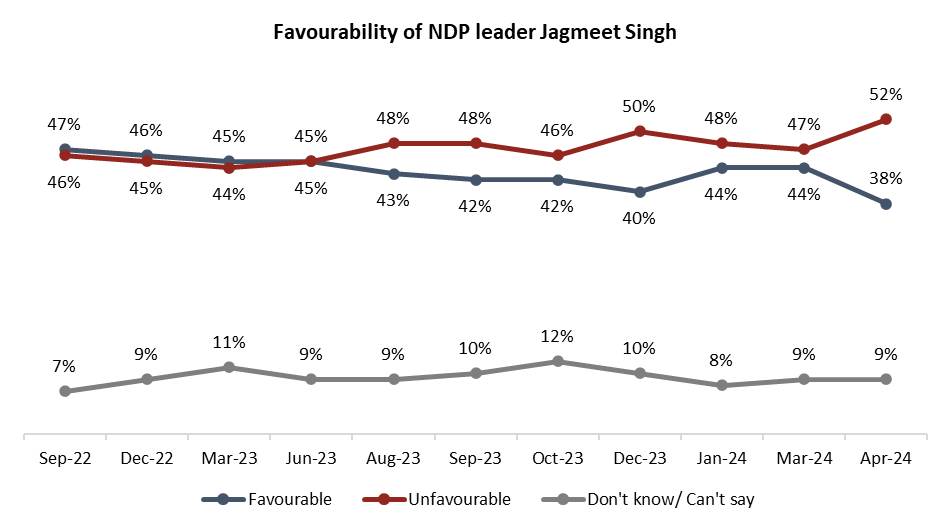 Momentum
Momentum
The lengthy rollout of the federal budget has apparently done little favour to Trudeau when it comes to Canadians’ appraisal of him. Half (49%, see detailed tables) of Canadians say their opinion of the prime minister has worsened, while a handful (5%) say it has improved. Canadians are most likely to say their opinion of Poilievre has improved, but only at a minority level of one-in-five (20%).
Improving views of Poilievre are more concentrated among CPC voters very committed to the party. However, he performs better (12%) on this metric than either Singh (6%) or Trudeau (5%) among voters who say they are “not committed at all”. None appear to be making significant inroads with undecided voters at the moment:
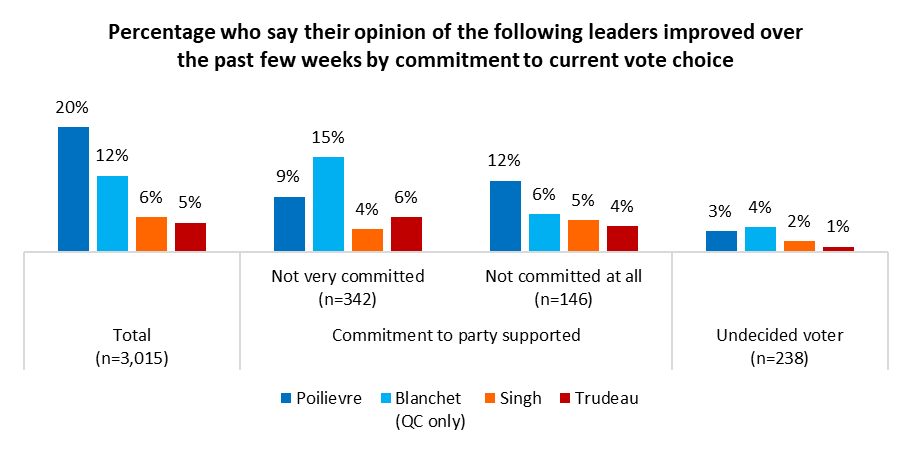
Part Two: Support for budget measures; but few believe it will make a difference
The Liberals have not seen a boost in their electoral fortunes from the budget, but that does not mean the major policies within the budget are unpopular. In fact, every budget item presented to respondents received majority approval. The new Canada Disability Benefit (74% approve), dental care (73%) and pharmacare (70%) receive a thumbs up from at least seven-in-ten Canadians overall, as well as half or more of every group of party supporters.
The major housing measures – leasing out federally owned lands to build affordable housing and funding infrastructure such as stormwater pipes for new housing developments – are also approved of by two-thirds of Canadians and at least half of supporters of the four major political parties (see detailed tables).
The housing measures also receive approval across demographics, while dental care and pharmacare are also supported by at least two-thirds of Canadians of all ages.
The budget’s focus on “generational fairness” is more popular among Gen Z and Millennials than Gen X (45- to 64-year-olds). There is also some contention among younger Canadians when it comes to cutting the number of employees in the federal public service and increasing defence spending:
But there is little belief among Gen Z adults and Millennials that the federal government will improve their financial situation or Canada’s economy. As well, Gen Z adults (64%) and older Millennials (58%) are the most likely to believe that the budget will worsen the housing affordability crisis:
As the federal government embarks on its multi-pronged approach to the housing affordability crisis, those on the outside of the market looking in are more likely to express doubt than confidence the federal government is on the right path. A majority (54%) of renters believe the changes will make housing affordability worse, while few (13%) believe they will in fact improve the situation:
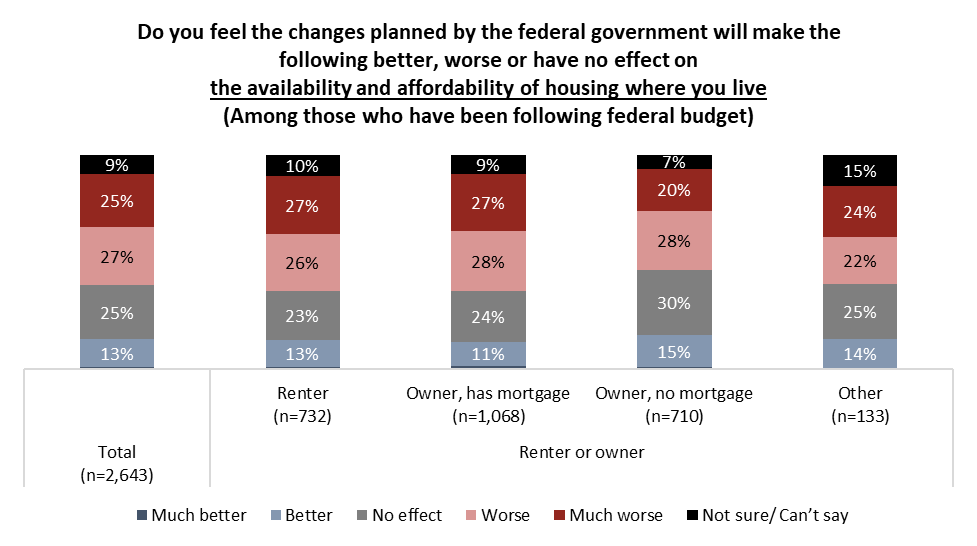
Overall, the federal government’s budget has not spurned much optimism from Canadians when it comes to their financial situation or the economic future of the country. Half (47%) of Canadians who are following the budget say they are more pessimistic about their personal financial situation than before, while a majority (56%) say their outlook of Canada’s economic future has grown more negative:

The capital gains conundrum
To keep the budget deficit to the $40 billion projected in the fall economic statement, and to cover the major new financial outlays contained within the budget, such as the increase in defence spending and the pharmacare and dental care programs, Finance Minister Chrystia Freeland and the Liberal government had to increase government revenue somewhere. So the budget includes an increase to the inclusion rate on capital gains, a measure which has caused much criticism, including from the Canadian Medical Association which said that it would hurt recruitment and retention of doctors. Some worry this will only exacerbate Canada’s economic growth issues.
Overall, however, half of Canadians believe raising the capital gains inclusion rate is a good idea. While three-in-ten (29%) Gen Z adults offer no opinion on the move, they are also the age group least likely to say it is a bad idea (26%):

Story by: Angus Reid Institute




